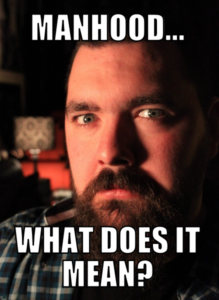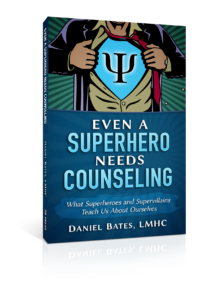Daniel Bates's Blog, page 3
December 29, 2016
The Challenge of Receiving Challenging Feedback
In the world of psychotherapy, a good counselor won’t always agree with their client. In fact, it may be necessary for a good counselor to disagree with their client in order to help them best. But this fact just apply to the world of therapy. It applies in many other areas of life. It’s self destructive to reject quality feedback that could help us because we want to protect our egos.
December 22, 2016
We Are Gaslighting our Kids
We need to respect revolution in this country. Parents can no longer demand respect from their kids when I don’t model it. This podcast of discover what the problem is when respect is not in place in the parent child relationship and how parents can start modeling respect.
December 20, 2016
Even A Superhero Needs Counseling Book Launch
Looking for that perfect Christmas gift for your comic book loving friend or family member? Look no further! Fans of the Marvel and DC movies and comics will love “Even A Superhero Needs Counseling.” In it you will find an in-depth guide to understanding your favorite comic book character from a psychological perspective while providing you with relevant and insightful advice. In other words, by learning more about Thor, the Hulk, Wonder Woman, Stephen Strange, Superman and many more, you can learn more about yourself. Comic books aren’t just entertainment; they can be a window into the strengths and weaknesses of humanity.
Daniel Bates is a Licensed Mental Health Counselor who offers his expert counsel for superhero, supervillain and readers alike. In each chapter, you’ll find:
An overview of major comic book character’s origin story, arch-enemies, and dynamics of their psychology.
A mental health diagnosis based on the relevant details of the character’s symptoms.
What mental health treatment would consist of based on the diagnosis and how it would help their life.
And, most importantly, how your favorite comic book character’s story can be informative for you own personal growth.
So, if you struggle with anxiety you’re in good company, Superman can relate. If you’ve had an addiction, you and Tony Stark could go to an Alcoholics Anonymous meeting together. Or, if you’ve ever had relationship problems, the Scarlet Witch can commiserate with you. Whatever the problem, you will find a superhero or supervillain that shares your struggle. And it is through their stories, you can find help for yours.
Click on the link to learn more or purchase on Amazon. The book is now available in paperback and the Kindle version is available for pre-order.
December 16, 2016
Emotion Bootcamp for Emotionally Limited Men
Let’s be honest, men suck with feelings. It’s a stereotype, but there’s some truth to the stereotype that men avoid feelings and vulnerability. But avoiding feelings and vulnerability comes at a great cost. Listen to understand how feelings are a good thing.
December 13, 2016
The Parent Toolbox
 Some parents think there is no alternative to shaming their kids in order to discipline, modify behavior and motivate them to change. However, shame is an ineffective discipline strategy at best. At worst, it causes developmental damage to your child, demotivates, and hurts your relationship with them. This is not just a statement based on my personal perspective. Many mental health professionals in the field of psychology agree that shaming a child only damages their development. Studies show that it is ineffective at changing bad behavior and motivating good behavior. And, in my clinical experience, I’ve seen shaming backfire in the face of many parents who use it as their parenting strategy. Shaming creates power struggles between parents and kids. Over time, kids rebel. Kids lose respect for their parent. And kids feel defeated. In short, shaming doesn’t work.
Some parents think there is no alternative to shaming their kids in order to discipline, modify behavior and motivate them to change. However, shame is an ineffective discipline strategy at best. At worst, it causes developmental damage to your child, demotivates, and hurts your relationship with them. This is not just a statement based on my personal perspective. Many mental health professionals in the field of psychology agree that shaming a child only damages their development. Studies show that it is ineffective at changing bad behavior and motivating good behavior. And, in my clinical experience, I’ve seen shaming backfire in the face of many parents who use it as their parenting strategy. Shaming creates power struggles between parents and kids. Over time, kids rebel. Kids lose respect for their parent. And kids feel defeated. In short, shaming doesn’t work.
But if shaming is all you know to do, as you take shaming away, what are you left with? Is there another way? Are there other tools parents can use to discipline their kids, keep them accountable, and give consequences for bad behavior? There are so many tools at your disposal that not only mitigate the damage done by shame, they are effective at motivating your child, fostering their development, enhancing self-efficacy, AND, most importantly, they build positive relationship between you and your child. So, what are some of the tools?
Shame Backfires on Parents
The purpose behind most parents actions is to influence their child in a positive way. Shame is influential, but in the way you want it to be. Shaming your child poisons the well of their relationship. Ooooh, so deep, what does it mean?
Let’s say you shame your child to discourage them from doing a bad behavior. Your child stops the bad behavior, but in the process of shaming them, you lose credibility and trust. Your child will not feel safe around you. You may not see it at first, but I’ve worked with enough families to know when kids don’t respect or trust their parents, it puts a brick wall between you and your child.
Even if shame does work, it ruins your relationship. But I’m getting ahead of myself because shaming doesn’t work. Its ineffective at stopping bad behavior and motivating kids to do good behavior.
Methods of Influence- There are a variety of ways parents can influence their kids in ways that are effective and build the relationship. Below I’ve listed three, but this is a short list. There are more creative, imaginative, persuasive and engaging ways to do it.
Rationale for Rules– If you can’t give a reasonable explanation for your rules, then they probably aren’t good rules, and they definitely won’t be followed by your kid. Have a calm, rational conversation with your child where you explain the reasoning for your rules. Let them ask questions. Kids are more likely to follow rules they understand and see the benefit of.
Honest Conversations– Have an honest conversation with your child regarding what they are really doing. If they are smoking weed, sneaking out to parties, hanging out with destructive peers, you need to know this so you can take appropriate action. The only way your child will tell you this information is if they feel safe. In order for them to feel safe, you can’t freak out when they tell what’s going on. Stay calm. Listen. Understand where they are coming from. And, if they are a teen, give them guidance not commands.
Understanding– You need to understand what your child thinks about the rules. You need to know why they won’t follow them. Or, where they have an issue with the rules. Even if you don’t agree with their perspective, at least you know what they’re getting hung up on. This is valuable information. Often, we parents think we know what our kids think, but we really don’t. Once you understand, then you can discuss.
Positive Reinforcement- Rewards are motivators. They should always come with conditions. The logic is very simple “If you do X, you get Y.” This is not an ironclad rule, sometimes it can be flexed. Do not put the cart before the horse. Meaning, do not reward your child hoping that will encourage good behavior. Rewards should follow good behavior. Don’t bribe your kids, motivate them.
Negative Reinforcement- Often times kids understand your rules and the reasoning behind them. They question you because they just don’t want to follow the rules. If this is the case, lead with enforcing the behavior you want. If they don’t obey then remove privileges, freedoms and access to rewards. Again, this is done for motivational purposes, not retributive. If your child think you are being retributive, then they will fight back, resist, and challenge you at every step.
Buy-In- Not to be contradictory, but I’m going to contradict nuance a statement I made above. Sometimes, the rationale for your rules are not understood by your child. Or, they were made without your child’s input. If you child is in their teenage years, they want and should have a voice in the rules they have to follow. When your child feels like they have a say, and their say matters, they will be more likely to follow the rules and contribute.
Relational Motivation- A positive relationship with your child can also be a motivator for them to follow the rules, understand your rationale, and be respectful. This requires you being respectful to them; to model the kind of behavior you want to see from them. The relationship is the most important thing you have with your child. Sometimes, you will have to put the relationship over and above getting what you want. If you have a good relationship with your child, meaning there is a positive connection, shared interest, good communication, respect, investment in each other, love and affection, your child will listen to you, follow your lead, and receive your input.
Don’t make the mistake of being overly dependent on shaming. Shame is something everyone feels without it being intentionally added to our lives. Shame is ineffective, hurts the relationship and demotivates kids. There are a plethora of tools available to parents that really work. So, do yourself and your child a favor and start learning how to use these parenting tools.
December 1, 2016
Men, You’re Doing It Wrong
Men are to be protectors and providers, but is that all they’re supposed to do? Find out more on Brainchild the podcast’s latest episode
Men, You Are Doing It Wrong
 Men commonly believe that their two main roles when it comes to marriage and family is to be a protector and a provider. Yes and no. Men are to be providers. Of course, no controversy there. You are supposed to contribute to your family. More and more these days women work too. So, it doesn’t matter who makes the most money, but make sure you are contributing. However, “contributing” restricted to just $$$. Contribute in other ways like decision making, family time, invest in your marriage. Put yourself out there, don’t just demand from your wife and family.
Men commonly believe that their two main roles when it comes to marriage and family is to be a protector and a provider. Yes and no. Men are to be providers. Of course, no controversy there. You are supposed to contribute to your family. More and more these days women work too. So, it doesn’t matter who makes the most money, but make sure you are contributing. However, “contributing” restricted to just $$$. Contribute in other ways like decision making, family time, invest in your marriage. Put yourself out there, don’t just demand from your wife and family.
Men are to be protectors. Again, most men wouldn’t argue with this statement. Our culture, most men and frankly most women would agree that men should protect their wives, kids, extended family and community. But doesn’t protection extended itself only to the physical realm? Are men supposed to be protectors in other ways? Shouldn’t men be protective of their marriages? Meaning, men shouldn’t be investing themselves physically, sexually and emotionally in relationships outside of marriage.
……. If you only protecting and providing, you are doing it wrong! There are more roles that you should fulfill as a man.
Men are also to be partners. Being a partner is a role men often neglect. Men think– if they are providing for their family financially, and no one has died– they are doing their job. If there’s money to pay the bills, no more work is to be done on their part… wrong! You are also a partner. So, what is a partner? A partner is someone who journey’s through life, with another person, through good and bad. The operative word here is with. So, what are some things you do with a partner? You communicate. You share experiences. You problem solve. You work towards a common set of goals. You are honest. These are things that honor the partnership you have with your wife and family.
Men are also to be pursuers. Even if you have been married for years and years, women want to feel like they are your object of pursuit. They want to feel wanted. No Duh! Pursuing is not just for dating relationships. Women want to know that you are thinking about them. They want to feel like you want them- sexually, emotionally, intimately, and daily. They want to see passion and hunger from you for them. So don’t be lazy and coast. Date your wife till the day you die. Also, pursue your kids. Your kids want to feel like you support their dreams, that the time you spend with them is valuable, and that invest in their interests.
Men are to be providers, protectors, partners and pursuers. These are the four roles that make a man a man.
November 30, 2016
What Doctor Strange Teaches Us About Spirituality

Doctor Strange, sorcerer supreme, master of black magic, former gifted neurosurgeon brings the “wiz” to “wizard.” Sorry, that was corny, but I couldn’t help myself. Stephen Strange, world-renowned surgeon, lost the use of his hands in a tragic car accident. Seeking salvation, he traverses the Himalayas to seek out a spiritual master. Learning the mystical arts, Stephen Strange transforms into Doctor Strange, one of the most powerful sorcerers on the planet. He possesses many tools in his arsenal, including the Cloak of Levitation, Eye of Agamotto, and the Book of Vishanti. With these powerful tools, Doctor Strange defends this reality from inter-dimensional beings seeking power, dominion and control over Earth.
Okay, that was the flashy highlight reel; let’s get into some more detail. Stephen was born in 1930 to Eugene and Beverly Strange. When Stephen was 8, he was attacked by demons under the control of Karl Mordo. Stephen was rescued by the Ancient One, Earth’s sorcerer supreme at the time. Stephen had two siblings, Donna and Victor. He was the oldest. When he was 11, young Stephen saved his sister’s life. This event was formative. Having saved his sister’s life, Stephen wanted to save others. Therefore, he pursued a medical degree.
Strange entered pre-med. And everything in Strange’s life seemed to look up, but he would soon face a rash of losses that would test him beyond what he could imagine. On a family vacation, Donna suffered a debilitating cramp while swimming and drown. Stephen was the one to find her body. He felt personally responsible for her death. Despite the devastating loss, Stephen progressed through medical school, residency and practice, at an accelerated pace. Strange was extremely gifted and talented. This made him arrogant. Then, his mother Beverly died.
Stephen went into medicine save the lives of others, but the deaths of his sister and mother challenged his idealistic vision. Stephen continued in medicine, but he did so with a cold heart. He didn’t want to get hurt again; consequently, he detached himself from the meaning of his job and only worked for the money and fame it brought him. Soon enough, money and recognition were all he cared about. Then his father grew ill. Afraid to face more grief, Stephen avoided seeing his dad. Victor, Stephen’s younger brother, came to see his brother and demanded to know why he was avoiding their father. They had a disagreement. Victor rushed out of Stephen’s apartment in anger and disappointment, but not watching where he was going. He walked into the path of an oncoming car. Stephen found Victor was near death, so he placed his brother’s body in cold storage. He did this hoping that one-day medical technology would advance to the point where his brother could be saved.
Years later, Strange would encounter another tragedy involving a car. Strange was involved in a tragic car accident that damaged the nerves in his hands. He would never perform surgery again. Not able to accept the loss of functioning hands, Stephen expended every penny he had to find a remedy, but nothing worked. He was desperate and willing to try anything. He hears of an eastern healer, the Ancient One, who may be able to help him. He throws caution to the wind, traversing the Himalayas in search of this eastern master. Upon arriving at the master’s palace, the Ancient One refuses to cure Strange’s hands. Yet, he does allow him to stay.
Mordo, the Ancient One’s apprentice, conspires against his master. Strange learns of the conspiracy and seeks to thwart Mordo. The plan fails and Mordo escapes. Out of anger towards Mordo, a growing sense of allegiance to the Ancient One, and intrigue with magical forces, Strange vows to learn the mystical arts and fight on the side of good. He becomes a master of magic and the mystical arts, eventually becoming the sorcerer supreme, defender of Earth.
Strange Reflections
Strange’s story, aside from entertaining us, communicates a deep truth: money can’t make you happy. Before the car accident, Stephen was arrogant, materialistic, and indifferent to others. He was all about himself. But the Doctor’s story wasn’t meant to end there; his life was destined for a greater purpose. Through a reversal of the “rags to riches” story, Stephen has it all, then loses everything. Yet, loss was his salvation.
Even though Stephen had every material need met, his spiritual needs went ignored. The damage to the nerves in his hands served as a wakeup call. He could no longer fill his life with material distractions. He had to face his true self. And what he saw, he didn’t like. Coming in contact with the supernatural reality opened his eyes and as a result, he was morally and spiritually transformed.
For many years, the significance of spirituality has been ignored by the medical and mental health fields. However, the psychological and physical benefits of spirituality are now being researched and integrated into healthcare.
Here are the top five characteristics of spiritual people:
Spiritual people are gracious. Psychology has demonstrated that expressing gratitude is associated with many positive emotions, such as optimism, generosity with time and resources, and overall vitality. Spirituality encourages people to be positive, which may be expressed in many of these life practices.
Spiritual people are compassionate. Compassion toward others is one the strongest correlates with living a spiritual life. A variety of positive or pro-social emotions have strong links with spiritualism, including the ability to feel good about the little things in life, and to look at the world through empathetic eyes.
Spiritual people flourish. Spirituality is linked to many important aspects of human functioning–spiritual people are optimistic, and have positive relationships, high self-esteem, meaning and purpose in life.
Spiritual people self-actualize. Spiritual individuals strive toward a better life and consider personal growth and fulfillment as a central goal. Spirituality is considered a path toward self-actualization, because it requires people to focus on their internal values and work on becoming a better individual.
Spiritual people take time to savor life experiences. Individuals who value spirituality take the time to reflect on their daily activities and ultimately build lasting memories of their experiences. Because spiritual people are more conscious of small, daily activities, they experience positive emotions associated with the smaller pleasures in life.
So, how did Stephen Strange stack up against these five characteristics of spiritual people? He was not gracious, but selfish. He was not compassionate, he was greedy. He was not flourishing, but floundering, moving forward without direction or purpose. He was not self-actualizing: instead, his personal growth was stalled. And he wasn’t savoring life: he was trying to fill a vacuum in his life with wealth, fame and prestige. Yet, when Strange had a spiritual awakening, his “after” picture looked a lot better. He was kinder, considerate, cared for the plight and suffering of others. He dedicated his life to fighting on the side of good and enjoyed a community of friends—the Avengers, Fantastic Four, X-Men, other sorcerers across the globe, and Wong, his best friend. I don’t know about you, but that’s a completely different person to me. That’s an entirely better quality of life. That’s a transformed life.
When reading the story of Stephen Strange, do you find yourself wishing you could have a similar transformation? Is your life lacking in a way that you can’t describe, as if something vital is missing, but you’re not sure what it is? Have you focused so much of your attention on medical, psychological, monetary or pharmacological problems that you’ve neglected your spiritual needs? Your relationships, physical health, career satisfaction impact your mental health, but so does your spiritual life. When was the last time you honestly evaluated your spiritual life?
Let me get at this another way. Do you feel a sense of awe in your life? Do you feel a sense of purpose when you wake up? When you make important decisions, what guides you? Is there meaning to your life? Does your story fit into a larger story, a grand narrative? Are you connected to other people? Do you have a community that supports you? Do you feel compassion and are lead to serve others? What rejuvenates, inspires, convicts and encourages you? If you’re not sure on some or most of these questions, you have a spiritual deficit in your life. Even if you don’t like the religious aspect of spirituality, look into it at least for the psychological and physical benefits. If you are interested in developing your spiritual life here are some straightforward and practical ideas practiced by mentally healthy people:
Join a Faith Community– Find a group that regularly meets for the purpose of connecting and supporting each other. A group that loves each other connects with a story bigger than their own and wants to do good. Connecting with a group like this is an amazing boost to physical and mental health.
Pray Every Day– This should not be intimidating, although many are by prayer. Just talk to the divine presence in your life. Share your struggles, victories and needs. It’s that simple.
Read Scripture– Find a scripture that inspires, convicts, strengthens and encourages you. Read it on a consistent basis. This doesn’t have to be a major commitment. 10-15 minutes is all you need and if you want to read more, then go for it!
Live Life with a Purpose– Your life is about more than just you. Your story fits into a larger narrative. Align your words, actions and thoughts with that purpose. It will give you a sense of meaning and intention as you go through your day.
Help Others– There is nothing more powerful than helping another person. People have attested that when going to out to bless another, they, in turn, are blessed. Helping another person can be “big” or “small,” it doesn’t matter. Doing good is always good.
Count your Blessings– Develop an attitude of gratitude. Many social science studies have supported this notion. When you mentally review the things you are grateful for, your mood improves. Try keeping a journal to record what you are grateful for.
It is Better to Give– It is true: it is better to give than receive. Giving to another person, cause, organization or charity bestows you with a sense of purpose. It broadens your perspectives. You become aware of lives, stories and needs outside of yourself. Always being self-focused can make corrode your mental health. Altruism is a mental health booster. Instead of buying that thing you don’t really need, give money, food or your time to someone who could use it.
Notice Beauty– Life is full of beautiful things, yet we tend to only notice the negative. Fight that tendency, because you are missing the most enriching aspects of life. Go to an art museum, take a hike, listen to your favorite piece of music, find and tell someone the funniest joke you’ve ever heard. These may seem like inconsequential things when faced with all the world’s problems, but the beautiful side of life is paramount. It fills us with a sense of awe and humility. And that has inestimable value.
If you’re spiritually out of shape, it may be hard to get into the rhythm. Millions and millions of people every day derive strength, encouragement, value, meaning and purpose from their spiritual life, and you can, too. Stephen Strange’s story, although fictional, is nonetheless true. His story expresses a universal truth. People are spiritual beings. You wouldn’t ignore your need for food, shelter, or community, so why would you ignore your spiritual needs. For some, it may take a catastrophic event, as in the case of Stephen Strange. Yet, it doesn’t have to be that way. You can live a spiritually transformed life now.
****If you liked this blog, be sure to check out Daniel’s upcoming book Even A Superhero Needs Counseling for more insightful analyses of your favorite superheroes and supervillains soon available on Amazon in paperback and Kindle.
Psychology Today: https://www.psychologytoday.com/blog/.... Retrieval: January, 15, 2016.
November 18, 2016
How to Stay Grounded when Detaching from Reality
Staying connected to reality can be a struggle for some. Here are some suggestions for staying grounded and centered.
November 17, 2016
How to Stay Grounded When Feeling Untethered to Reality
 Imagine feeling like everyone you know, everything around you, everything you are thinking and feeling is fake. That what you are experiencing can’t be trusted. And instead being in the here-and-now, you feel like a detached observer, watching yourself from a disconnected vantage point and there’s no way for you to reconnect yourself and reality. No, this isn’t the plot of Christopher Nolan’s movie Inception. This is a real phenomenon that people deal with everyday. And before you start thinking the experience sounds kind of cool, I can assure you, its not.
Imagine feeling like everyone you know, everything around you, everything you are thinking and feeling is fake. That what you are experiencing can’t be trusted. And instead being in the here-and-now, you feel like a detached observer, watching yourself from a disconnected vantage point and there’s no way for you to reconnect yourself and reality. No, this isn’t the plot of Christopher Nolan’s movie Inception. This is a real phenomenon that people deal with everyday. And before you start thinking the experience sounds kind of cool, I can assure you, its not.
Feeling disconnected from reality is an awful experience. When you don’t feel connected to your body or thoughts it can feel like your not in control of yourself, like your detached from reality. In other words, you feel like you can’t trust yourself and your surrounding, as if you are losing yourself. Clinical terms used to describe this experience are:
Depersonalization- An internal feeling of disconnection from oneself, i.e. self-estrangement.
Derealization- An external feeling of disconnection from one’s surroundings,
Dissociation- Detachment from physical and emotional experience.
Depersonalization, derealization and dissociation (what I’ll call going forward “DDD”) have been informally described as a psychotic break, feeling numb, an out of body experience, or disconnection from reality. The experience of DDD can be short term, lasting a few minutes, or, it can be long-term, lasting years. The experience can be so disorienting that some have committed suicide. Typically, DDD is associated with psychoses, however, people suffering from severe depression, PTSD, Bipolar disorder, drug intoxication, and some personality disorders can cause DDD.
There is a caveat worthy of mention regarding DDD. In a way, DDD can have a survival function. What do I mean by that? When people are experiencing intense trauma, i.e. domestic violence and abuse, rape, warfare, a violent attack and so on, the brain will detach from first-person experience and shift one’s perception to that of an observer. And, in some regards, this is a preferable perceptual vantage point than the first-person experience. Think of it, would you want to experience every moment, every pain, every rush of fear, terror, shock and horror of being raped? No, of course not. You’d much rather be detached from the experience. The true horror is when someone doesn’t detach, and they experience every excruciating moment of their trauma.
That being said, the experience of DDD in non-trauma situations, that which is persistent and chronic, can make life near impossible. What was once adaptive in a survival situation, becomes maladaptive in normal life. Normal life is filled with emotional experiences, good and bad, that are appropriate to feel. But DDD sabotages normal emotional experience, so that, when you are experiencing joy, pleasure, contentment, happiness, closeness and excitement, the feelings are quickly anesthetized, and replaced with a numb feeling. DDD is an emotional killer. Emotions are critical for healthy functioning. In other words, without emotion you cannot process grief, learn from experience and feel the joys of life.
Also, those suffering from DDD experience intense anxiety because they don’t know when an episode of DDD will hit them. And, in fact, the anxiety of not wanting to experience DDD can actually trigger an experience of DDD. This is a vicious cycle that overwhelms and ensnares the DDD sufferer.
So, what can you do if you suffer from DDD? Is there hope? Are there solutions, techniques, and approaches that can help? In short, yes, there is hope. There are things you can do, behaviorally, to help yourself. And, there are professionals that can provide you with counseling and medication that effectively treat DDD.
First things first, I’d first recommend seeing a psychologist to get a mental health evaluation. Based on their assessment, you can see a psychiatrist to get evaluated and prescribed medication that can help. In terms of behavioral interventions that can help you feel grounded and centered, here are my suggestions:
Self-Observation: Now, this may seem like an ironic suggestion since part of the problem is feeling like your an observer. But the point of this is to make first-person observations. Those first-person observations are very grounding. They relocate you in the here-and-now. Self-observations also have to do with recognition. If you can recognize that you are having a DDD episode, you can then intervene on yourself to change your experience. But, this is not possible unless you have awareness of what’s happening.
Stay Calm: Once you’ve recognized you are having a DDD episode, don’t panic. Panic is like cement for DDD. If you can remain calm after becoming aware of the DDD episode, you are more likely to work your way out of it.
Radical Acceptance: When you try fighting against DDD, you are actually giving it energy. DDD feeds off of your resistance. Instead, accept that you are having a DDD moment. It’s okay to feel numb, or detached. It’s not the end of the world. You can work your way out of it.
Positive Self-Talk: After accepting the fact that you are having a DDD moment, talk to yourself in a positive manner. Think of it like this, what would you tell your best friend if they were having a DDD moment? You’d probably say something like “Its going to be okay,” “You are safe,” “This isn’t going to last for forever,” “Stay calm,” “This will be over soon,” and “There’s hope.” Use those same positive messages, but with yourself. In fact, I’d recommend making these positive self-talk statements to yourself throughout the day so that you are prepared for a DDD episode.
Self-Soothing: This concept comes from child developmental psychology. The idea is rather simple, when you are feeling emotionally flooded, regulate your feelings by soothing yourself. So, for example, when a baby is crying and finds their thumb, that is self-soothing. Obviously, I’m not suggesting you start sucking your thumb, but, I do suggest you develop some self-soothing strategies such as deep breathing, physical exercise, watching a favorite TV-show, eating chocolate, talking to a friend and so on. The self-soothing plan can be as unique and particular to you as you want it. If something works, then do it, just as long as you are not harming yourself or another person.
Hopefully, this information is helpful. Please do yourself a favor and do not ignore DDD. It is a mental illness that steals joy and can lead to suicide. However, it is not permanent. There are effective treatments for DDD. Seeing a counselor, working with a psychiatrist, taking medication and using the tips provided above can help. With effort, over time, you will see change.




